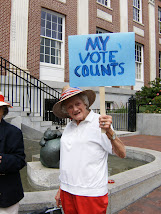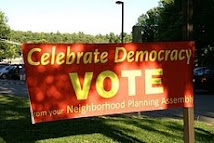*Reminder, the city checklist is bloated, especially in wards populated by students - 34,778; and, as Roger suggests below, voters feel used and abused and trust is lacking. Some residents reported voting early at City Hall, where staff left their ballots on a desk in the clerk's office instead of placing them in a locked box. Kilbourn suggests replacing mayor with City Manager, and others suggest replacing Asst. CAO with an elected City Clerk.
With turnout tiny in some wards, Burlington voters showed frustration BY JOHN BRIGGS, FREE PRESS STAFF WRITER • THURSDAY, MARCH 3, 2011
He attempted no explanation for the low turnout (17 percent) or for the poor numbers (for him) across the city. In interviews Wednesday, others did, pointing to a disillusioned electorate and an inability of the mayor or other leaders to generate enthusiasm for the measures on the ballot.
It was residents in Wards 4 and 7 who supplied the lion's share of votes against measures Kiss supported -- including a 4-cent tax increase and a 50-percent threshold for electing a mayor. These were the wards that demonstrated the highest voter turnout, 37 percent and 31 percent, respectively.
Elsewhere, the voting numbers were startling, even for those who campaigned against the proposed tax increase and the 50 percent voting requirement for mayor. Turnout estimates show voting was miniscule in Wards 1 (8 percent), 2 (7 percent), 3 (11 percent) and 6 (14 percent).
Roger Kilbourn, a New North End resident and lifelong Democrat who works as a real estate appraiser for the state tax department, said he wasn't surprised to see the budget items go down.
"We the voters have so little control over what government does," he said. "What can you do other than say 'no'?"
He thinks many of his neighbors and others in town have become so frustrated over issues such as Burlington Telecom's financial woes they have "just thrown up their hands" because the politicians "are going to do what they're going to do." Frustration and discontent, he said, lead to low participation in government.
"You had a clear, bright day," he said, and even though modest turnout is predictable in an off-year election, Tuesday's 17 percent indicated "people are disengaging, and those who did turn out are sufficiently motivated by their anger."
The tax increase that Kiss said was necessary passed only in Ward 2 (by seven votes); citywide, 69 percent of those who voted rejected it. The negative numbers were highest in the New North End (77 percent in Ward 4 and 81 percent in Ward 7).
Heavy "no" votes in the New North End and Ward 6 also sank the 50 percent for mayor question (58 percent "no" in total), but the "yes" votes in Wards 1, 2, 3 and 5 weren't overwhelming. The greatest support was in Ward 2, where the vote for change to a 50-percent requirement was 227-151 (60 percent in favor).
Kilbourn said the management issues that have surfaced in the last 18 months suggest to him that Burlington might need to consider moving to a city-manager form of government with a manager "working at the pleasure of the council. You need someone who has been trained and has experience in local government management," he said. "Clearly, we don't have that today."
City government has become too complex, he said, "to rely on a politician."
Dave Hartnett, a conservative Democrat who was unopposed for the council seat in Ward 4, recoiled from the city-manager suggestion.
"I don't want the last five years to set a precedent for how we govern the city," he said. "It's worked well in the past."
He called Tuesday "a sad day" for the city.
"I can't remember a day in Burlington when people have voiced their displeasure so loudly," he said. "It was really kind of doomsday, and I don't recall such a low turnout. I think the people who stayed home are so discouraged they're giving up."
"I think we're in for a long year," he said. The mayor's seat is up for election in 2012.
David Zuckerman, a Progressive and former state representative, said the election was not simply a referendum on Kiss.
"There were very few contested races and little energy on any issue," he said.
He said the lassitude is a reflection of Kiss's inability to generate "excitement around the potential in Burlington civic life." But he also suggested that Democrats on the council failed to push for passage of the 50 percent issue or announce their support for the Burlington Electric Department bond issue, which failed.
"Bob didn't communicate well," Zuckerman said of Kiss, "the caucuses of the council didn't communicate well, and that leads to antipathy. Between some of Bob's communications issues and the negativity from those who like to score political points, many people are just tired of it."
To analyze turnout by ward in Burlington’s election Tuesday, the Free Press reviewed voting totals from the school budget question, which had the highest number of total votes with 5,922. The figures approximate but do not necessarily equal true voting turnout, since not all voters necessarily voted on this particular question.
Read the Comments for some thought-provoking responses.
















